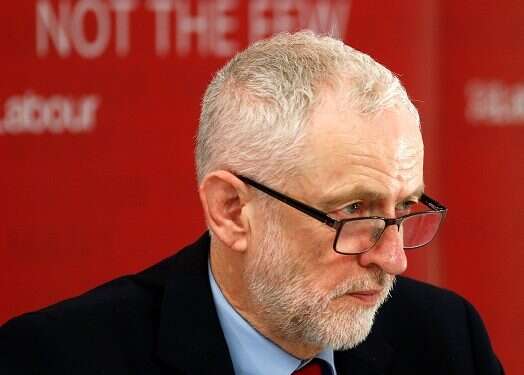Jewish community leaders in Britain said their talks on Tuesday with Labour Party leader Jeremy Corbyn on how to end anti-Semitism in his party had been a "disappointing missed opportunity."
Corbyn met with the Board of Deputies of British Jews and the Jewish Leadership Council after they organized a protest last month accusing him of failing to tackle anti-Semitism in his party because of far-left worldviews hostile to Jews.
Before the meeting, Corbyn acknowledged that anti-Semitism had surfaced within his party and apologized for the pain this had caused.
But after the meeting, the groups said Corbyn had failed to agree there should be a fixed timetable to deal with cases of anti-Semitism or that no member of Parliament should share a platform with somebody expelled or suspended for anti-Semitism.
"Our meeting with Jeremy Corbyn today was a disappointing missed opportunity," the two bodies said in a statement.
"We welcome the fact that Mr. Corbyn's words have changed, but it is action by which the Jewish community will judge him and the Labour Party."
Some opinions polls put Labour almost level with Prime Minister Theresa May's Conservatives, although the next election is not due until 2022.
Since unexpectedly becoming Labour leader in 2015 after decades spent on the left-wing fringes of the party, Corbyn has repeatedly faced accusations of turning a blind eye to anti-Semitism in the party.
After Tuesday's meeting, Corbyn reiterated that he was committed to stamping out the problem.
Writing in the Evening Standard, he admitted his party had "not done enough" to tackle the issue and said Labour's methods of dealing with anti-Jewish abuse were "not fully fit" for the purpose.
"When members of Jewish communities express genuine anxieties, we must recognize them as we would those of any other community," he said. "Their concerns are not 'smears.' Jews belong in the Labour Party and we are utterly committed to making it a safe and welcoming place for them."
Corbyn had said he wanted to use the meeting to discuss the resurgence of "both old and new forms of anti-Semitism." He said he had made a commitment to "strive to understand why anti-Semitism has surfaced in our party."
In the Evening Standard, he wrote, "Anti-Semitism is a poison that must be challenged wherever it raises its head, across Europe and at home. Hatred and bigotry towards Jewish people has no place in our society, whether on the streets or online. And that, of course, goes for the Labour Party, too.
"We have not done enough to get to grips with the problem, and the Jewish community and our Jewish members deserve an apology. My party and I are sorry for the hurt and distress caused."
He outlined a series of steps Labour will take to address the problem, including a "program of political education" to help party members recognize and tackle anti-Semitism, and the appointment of a legal expert to advise on disciplinary matters.
While claiming the number of Labour members being investigated for anti-Semitism amounts to 0.1% of the party's membership, Corbyn said, "We must also face the uncomfortable fact that a small number of our members and supporters hold anti-Semitic views and attitudes, which need to be confronted and dealt with more rapidly and effectively.
"The evidence is clear enough. Labour staff have seen examples of Holocaust denial, crude stereotypes of Jewish bankers, conspiracy theories blaming 9/11 on Israel, and even one member who appeared to believe that Hitler had been misunderstood."
A debate in Parliament last week underlined the extent of the criticism of Corbyn over anti-Semitism, with Jewish members of his own party describing in powerful terms the abuse they and Jewish friends were experiencing.
A Labour member of Parliament said last week his wife had been threatened with rape and the family had been sent a dead bird in the post after he attended the demonstration against anti-Semitism.




